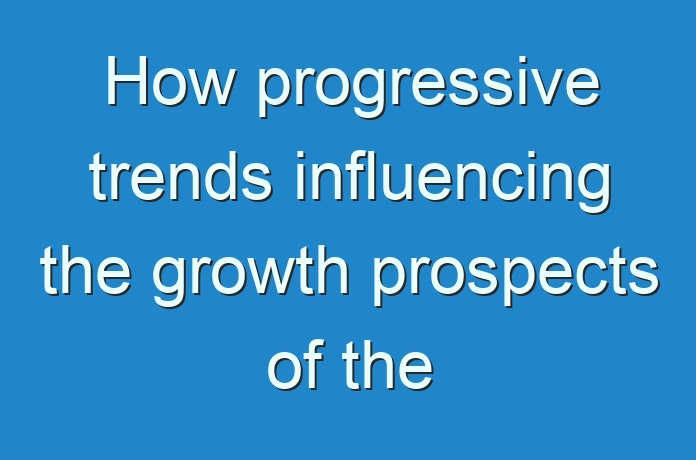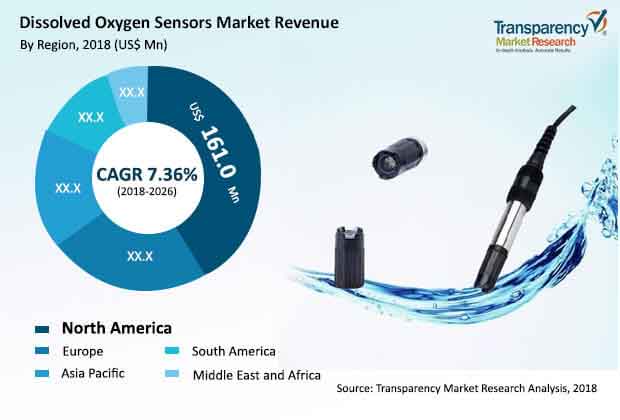
The global dissolved oxygen sensors market was valued at US$ 412.1 Mn in 2017 and is projected to expand at a compound annual growth rate (CAGR) of 7.36% from 2018 to 2026, according to a new report published by Transparency Market Research (TMR) titled “Dissolved Oxygen Sensors Market– Global Industry Analysis, Size, Share, Growth, Trends, and Forecast, 2018–2026.” Need for minimized installation and maintenance time along with the growing importance of environmental monitoring are primary factors that are expected to boost the market during the forecast period. Human activities such as deforestation and construction have led to global climate change and degradation of the environment. In order to tackle the issue, various government and private institutions are undertaking environmental management. Environmental management also comprises monitoring of water quality by collecting specimens and samples from water bodies to identify biological or physical factors that can affect natural habitats and ecosystems. Furthermore, dissolved oxygen sensors, including optical and electrochemical sensors are being used frequently to monitor the condition of water bodies, including streams, lakes, rivers, and estuaries.

Request a Sample of Dissolved Oxygen Sensors Market – https://www.transparencymarketresearch.com/sample/sample.php?flag=S&rep_id=37433
Sensor bleaching from constant light exposure can hamper the dissolved oxygen sensors market
Optical dissolved sensors have numerous advantages over electrochemical DO sensors, including reduced maintenance, higher calibration stability, and zero warm-up time. Furthermore, optical DO sensors are unaffected by water contaminants, including H2S (hydrogen sulfide). Nonetheless, significant exposure to sunlight leads to bleaching of the sensors over a period of time. Bleaching results in losing of the ability to absorb the light and degrades the efficiency of the sensor. For certain optical DO sensors, the effect is accelerated if the sensor is exposed to direct sunlight.
Optical type dissolved oxygen sensor segment is expected to hold significant market share during the forecast period
In terms of type, the dissolved oxygen sensors market is segmented into optical and electrochemical. The electrochemical DO sensors segment is further classified into Galvanic and Polarographic dissolved oxygen sensors. In 2017, the optical segment accumulated the highest share of the market and is projected to witness significant CAGR growth over the forecast period. Advantages such as requirement of lesser maintenance, requirement of no warm up time, and very little calibration drift are some of the major factors driving the adoption of optical dissolved oxygen sensors. Nonetheless, with comparatively lesser price than optical DO sensors, Galvanic dissolved oxygen sensors are gaining traction in applications including wastewater treatment facilities.
Dissolved oxygen sensors market in Asia Pacific expanding at a rapid pace
The market in Asia Pacific is expected to expand at a considerable CAGR during the forecast period. This growth is mainly due to the presence of well-established market players including Yokogawa Electric Corporation. Also, the growth is fueled by significant economies such as China, Japan, and India. Furthermore, players from the region are rapidly expanding their businesses in other areas for additional revenue generation. In December 2017, Yokogawa teamed up with Australia-based industrial process analysis instruments manufacturer, Applied Analytics Inc. to cater to the rising demand for a range of process analyzers emerging from New Zealand and Australia.
Key players such as Emerson Electric Co., Honeywell International Inc., and Hach Company likely to lead the dissolved oxygen sensors market
Emerson Electric Co., Honeywell International Inc., Hach Company, and Siemens AG are some of the major players operating in the dissolved oxygen sensors market, profiled in this study. Various companies are establishing partnerships and are carrying out strategic expansions to enhance their dissolved oxygen sensors technology offerings worldwide. For instance, Hach, a Loveland, Colorado-based water quality analysis and testing instruments provider has been a strategic partner of Siemens for a very long time. Furthermore, Hach complements Siemens’s product portfolio with the provision of process liquid analytics such as turbidity or dissolved oxygen sensors, pH, and conductivity.
Global Dissolved Oxygen Sensors Market Segmentation
Global Dissolved Oxygen Sensors Market, by Type
- Optical
- Electrochemical
- Galvanic
- Polarographic
Global Dissolved Oxygen Sensors Market, by Application
- Wastewater treatment
- Aquaculture
- Environmental Sciences
- Food & Beverages
- Others
Global Dissolved Oxygen Sensors Market, by Geography
- North America
- The U.S.
- Canada
- Rest of North America
- Europe
- The U.K
- Germany
- France
- Rest of Europe
- Asia Pacific (APAC)
- China
- India
- Japan
- Rest of APAC
- Middle East & Africa (MEA)
- GCC Countries
- South Africa
- Rest of MEA
- South America
- Brazil
- Rest of South America
Looking for exclusive market insights from business experts? Buy Now Report here https://www.transparencymarketresearch.com/checkout.php?rep_id=37433<ype=S
About Us
Transparency Market Research is a global market intelligence company, providing global business information reports and services. Our exclusive blend of quantitative forecasting and trends analysis provides forward-looking insight for thousands of decision makers. Our experienced team of Analysts, Researchers, and Consultants, use proprietary data sources and various tools and techniques to gather, and analyze information.
Our data repository is continuously updated and revised by a team of research experts, so that it always reflects the latest trends and information. With a broad research and analysis capability, Transparency Market Research employs rigorous primary and secondary research techniques in developing distinctive data sets and research material for business reports.
Contact
Transparency Market Research,
90 Sate Street, Suite 700,
Albany, NY 12207
Tel: +1-518-618-1030
USA – Canada Toll Free: 866-552-3453





